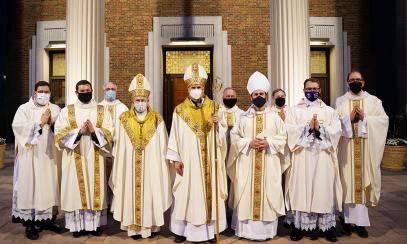Ecumenical Faith and Civil Leaders Promote Racial Justice
Local faith and civil leaders gathered to stand in ecumenical solidarity during a rally for racial justice in mid-June at the University of St. Francis, where they issued a plea for repentance, a commitment for racial justice and a way forward.
“We have to look at our conversion, specifically speaking, especially to the middle-class, white male and female members of our United States,” said Bishop Richard Pates, the diocesan apostolic administrator. “We have to move from indifference to achieve the promise of this country across the board. … May we emerge from the shadows of racism into the bright sunshine of human rights and for love of all the members of the human family.”
In addition to lifting prayers, the speakers talked about the need to recognize all the human dignity of all people and to decry the sins of racism.
Elisabeth Román, the diocesan director of the Office of Hispanic Ministry/Ethnic Ministries, speaking in Spanish during the majority of her remarks, lamented about seeing the number of videos showing people of color dying at the hands of the police.
“As a parent of two beautiful brown sons, my prayer is that they never have to encounter a cop who has no respect for their lives, simply because of the color of their skin,” she said. “That, unfortunately, is the concern of every black and Latino parent in this country. The allegations of excessive force of police brutality is nothing new, and … that is why we have come together today at this university that stands for peace with our brothers and sisters in an ecumenical way to pray for peace and justice, to pray for human dignity, for the law of people to be respected and honored, because they are the children of God, created in His image.”
Twelfth Judicial Circuit Court of Will County Judge Vincent Cornelius shared a litany of words — see, speak, stand, stay, study — in which he offered a heartfelt plea for others to stand in solidarity with him and acknowledge his humanity.
“See my color,” he said. “I can’t afford for you to be color blind.
… Speak: don’t retreat to the safety of silence when I am harmed.
… Stand: stand with us in sincerity and stand with us when we are in danger. … Stay: stay by our side; that is, continue to stay with us. Continue to stand with us when the protests have ended. … Study: study our history, our circumstances, how we got here. ...so that we are speaking the same language, so that we have the same common denominator of knowledge.”
It’s vital to know more than the definition of systemic, he said; it’s important to understand its history, development and power in his plight so that everyone’s solidarity is not reduced to a “kum- baya” moment.
“If we can listen to a mourning of a people without predisposition, then we might find hope for the morning of a tomorrow,” he said. “The prophets of every people who believe in a God speak about justice. To love anyone as your neighbor requires an acknowledgement that they too are human. This is not the promise of America; this is the inalienable right of humanity to be seen and treated as a human being and this is the solidarity for which we pray.”


